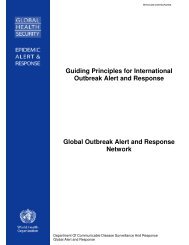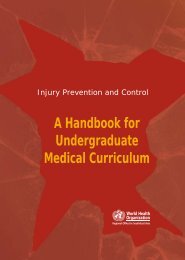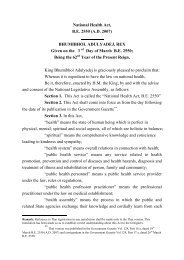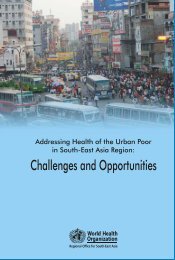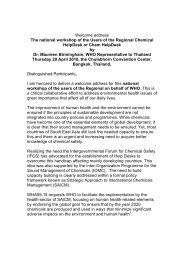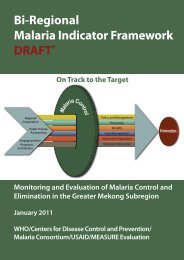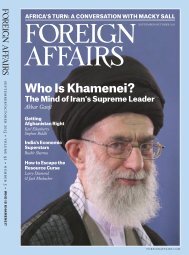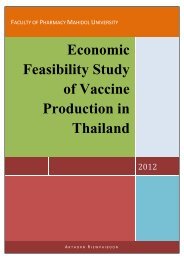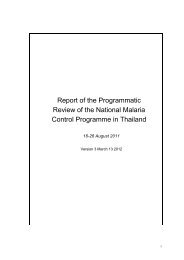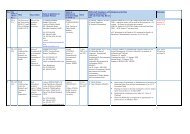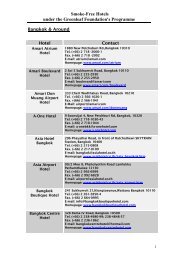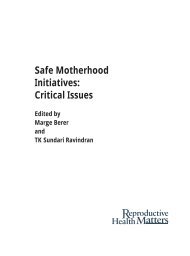- Page 2 and 3:
A joint report by thetwenty three U
- Page 4 and 5:
Lists of Figures, Maps, Boxes & Tab
- Page 6 and 7:
F I G U R E S / V9.1: Competing wat
- Page 8 and 9:
B O X E S / VII19.1: Seine-Normandy
- Page 10 and 11:
X/ P R E L I M I N A R YFigures, Ma
- Page 12 and 13:
B O X E S B Y R E G I O N S / X IEu
- Page 14 and 15:
T A B L E S / XIII5.3: Africa, Asia
- Page 16 and 17:
A C K N O W L E D G E M E N T S / X
- Page 18:
A C K N O W L E D G E M E N T S / X
- Page 21:
X X/ P R E L I M I N A R YPrologueP
- Page 24 and 25:
P R E F A C E / X X I I IWWAP consi
- Page 26:
iWater is an essential element of d
- Page 29 and 30:
4 / S E T T I N G T H E S C E N EWh
- Page 31 and 32:
6 / S E T T I N G T H E S C E N ETh
- Page 33 and 34:
8 / S E T T I N G T H E S C E N ETh
- Page 35 and 36:
1 0 / S E T T I N G T H E S C E N E
- Page 37 and 38:
1 2 / S E T T I N G T H E S C E N E
- Page 39 and 40:
1 4 / S E T T I N G T H E S C E N E
- Page 41 and 42:
1 6 / S E T T I N G T H E S C E N E
- Page 43 and 44:
1 8 / S E T T I N G T H E S C E N E
- Page 45 and 46:
2 0 / S E T T I N G T H E S C E N E
- Page 47 and 48:
2 2 / S E T T I N G T H E S C E N E
- Page 49 and 50:
2 4 / S E T T I N G T H E S C E N E
- Page 51 and 52:
2 6 / S E T T I N G T H E S C E N E
- Page 53 and 54:
2 8 / S E T T I N G T H E S C E N E
- Page 55 and 56:
3 0 / S E T T I N G T H E S C E N E
- Page 57 and 58:
3 2 / S E T T I N G T H E S C E N E
- Page 59 and 60:
3 4 / S E T T I N G T H E S C E N E
- Page 61 and 62:
3 6 / S E T T I N G T H E S C E N E
- Page 63 and 64:
3 8 / S E T T I N G T H E S C E N E
- Page 65 and 66:
4 0 / S E T T I N G T H E S C E N E
- Page 67 and 68:
4 2 / S E T T I N G T H E S C E N E
- Page 69 and 70:
4 4 / S E T T I N G T H E S C E N E
- Page 71 and 72:
4 6 / S E T T I N G T H E S C E N E
- Page 73 and 74:
4 8 / S E T T I N G T H E S C E N E
- Page 75 and 76:
5 0 / S E T T I N G T H E S C E N E
- Page 77 and 78:
5 2 / S E T T I N G T H E S C E N E
- Page 79 and 80:
5 4 / S E T T I N G T H E S C E N E
- Page 81 and 82:
5 6 / S E T T I N G T H E S C E N E
- Page 83 and 84:
5 8 / S E T T I N G T H E S C E N E
- Page 85 and 86:
6 0 / S E T T I N G T H E S C E N E
- Page 88 and 89:
4Table of contentsMeasuring Water R
- Page 90 and 91:
T H E N A T U R A L W A T E R C Y C
- Page 92 and 93:
T H E N A T U R A L W A T E R C Y C
- Page 94 and 95:
T H E N A T U R A L W A T E R C Y C
- Page 96 and 97:
Table 4.2: continued35 N C America
- Page 98 and 99:
Table 4.2: continued111 Africa Nige
- Page 100 and 101:
T H E N A T U R A L W A T E R C Y C
- Page 102 and 103:
T H E N A T U R A L W A T E R C Y C
- Page 104 and 105:
T H E N A T U R A L W A T E R C Y C
- Page 106 and 107:
T H E N A T U R A L W A T E R C Y C
- Page 108 and 109:
T H E N A T U R A L W A T E R C Y C
- Page 110 and 111:
T H E N A T U R A L W A T E R C Y C
- Page 112 and 113:
T H E N A T U R A L W A T E R C Y C
- Page 114 and 115:
T H E N A T U R A L W A T E R C Y C
- Page 116 and 117:
T H E N A T U R A L W A T E R C Y C
- Page 118 and 119:
T H E N A T U R A L W A T E R C Y C
- Page 120 and 121:
T H E N A T U R A L W A T E R C Y C
- Page 122:
iiiIt is in the context of a global
- Page 125 and 126:
1 0 0 / C H A L L E N G E S T O L I
- Page 127 and 128:
1 0 2 / C H A L L E N G E S T O L I
- Page 129 and 130:
1 0 4 / C H A L L E N G E S T O L I
- Page 131 and 132:
1 0 6 / C H A L L E N G E S T O L I
- Page 133 and 134:
1 0 8 / C H A L L E N G E S T O L I
- Page 135 and 136:
1 1 0 / C H A L L E N G E S T O L I
- Page 137 and 138:
1 1 2 / C H A L L E N G E S T O L I
- Page 139 and 140:
1 1 4 / C H A L L E N G E S T O L I
- Page 141 and 142:
1 1 6 / C H A L L E N G E S T O L I
- Page 143 and 144:
1 1 8 / C H A L L E N G E S T O L I
- Page 145 and 146:
1 2 0 / C H A L L E N G E S T O L I
- Page 147 and 148:
1 2 2 / C H A L L E N G E S T O L I
- Page 149 and 150:
1 2 4 / C H A L L E N G E S T O L I
- Page 152 and 153:
6Table of contentsSignificance of F
- Page 154 and 155:
P R O T E C T I N G E C O S Y S T E
- Page 156 and 157:
P R O T E C T I N G E C O S Y S T E
- Page 158 and 159:
P R O T E C T I N G E C O S Y S T E
- Page 160 and 161:
P R O T E C T I N G E C O S Y S T E
- Page 162 and 163:
P R O T E C T I N G E C O S Y S T E
- Page 164 and 165:
P R O T E C T I N G E C O S Y S T E
- Page 166 and 167:
P R O T E C T I N G E C O S Y S T E
- Page 168 and 169:
P R O T E C T I N G E C O S Y S T E
- Page 170 and 171:
P R O T E C T I N G E C O S Y S T E
- Page 172 and 173:
P R O T E C T I N G E C O S Y S T E
- Page 174 and 175:
P R O T E C T I N G E C O S Y S T E
- Page 176 and 177:
P R O T E C T I N G E C O S Y S T E
- Page 178 and 179:
P R O T E C T I N G E C O S Y S T E
- Page 180 and 181:
P R O T E C T I N G E C O S Y S T E
- Page 182 and 183:
1 5 8 / C H A L L E N G E S T O L I
- Page 184 and 185:
1 6 0 / C H A L L E N G E S T O L I
- Page 186 and 187:
1 6 2 / C H A L L E N G E S T O L I
- Page 188 and 189:
1 6 4 / C H A L L E N G E S T O L I
- Page 190 and 191:
1 6 6 / C H A L L E N G E S T O L I
- Page 192 and 193:
1 6 8 / C H A L L E N G E S T O L I
- Page 194 and 195:
1 7 0 / C H A L L E N G E S T O L I
- Page 196 and 197:
1 7 2 / C H A L L E N G E S T O L I
- Page 198 and 199:
1 7 4 / C H A L L E N G E S T O L I
- Page 200 and 201:
1 7 6 / C H A L L E N G E S T O L I
- Page 202 and 203:
1 7 8 / C H A L L E N G E S T O L I
- Page 204 and 205:
1 8 0 / C H A L L E N G E S T O L I
- Page 206 and 207:
1 8 2 / C H A L L E N G E S T O L I
- Page 208 and 209:
1 8 4 / C H A L L E N G E S T O L I
- Page 210 and 211:
1 8 6 / C H A L L E N G E S T O L I
- Page 212 and 213:
8 BoxTable of contents8.1: The righ
- Page 214 and 215:
S E C U R I N G F O O D F O R A G R
- Page 216 and 217:
S E C U R I N G F O O D F O R A G R
- Page 218 and 219:
Table 8.1: National values of key i
- Page 220 and 221:
Table 8.1: continuedGuadeloupe - -
- Page 222 and 223:
Table 8.1: continuedSlovakia - 0.1
- Page 224 and 225:
S E C U R I N G F O O D F O R A G R
- Page 226 and 227:
S E C U R I N G F O O D F O R A G R
- Page 228 and 229:
S E C U R I N G F O O D F O R A G R
- Page 230 and 231:
S E C U R I N G F O O D F O R A G R
- Page 232 and 233:
S E C U R I N G F O O D F O R A G R
- Page 234 and 235:
S E C U R I N G F O O D F O R A G R
- Page 236 and 237:
S E C U R I N G F O O D F O R A G R
- Page 238 and 239:
S E C U R I N G F O O D F O R A G R
- Page 240 and 241:
S E C U R I N G F O O D F O R A G R
- Page 242 and 243:
S E C U R I N G F O O D F O R A G R
- Page 244 and 245:
S E C U R I N G F O O D F O R A G R
- Page 246 and 247:
S E C U R I N G F O O D F O R A G R
- Page 248 and 249:
2 2 6 / C H A L L E N G E S T O L I
- Page 250 and 251:
2 2 8 / C H A L L E N G E S T O L I
- Page 252 and 253:
2 3 0 / C H A L L E N G E S T O L I
- Page 254 and 255:
2 3 2 / C H A L L E N G E S T O L I
- Page 256 and 257:
2 3 4 / C H A L L E N G E S T O L I
- Page 258 and 259:
2 3 6 / C H A L L E N G E S T O L I
- Page 260 and 261:
2 3 8 / C H A L L E N G E S T O L I
- Page 262 and 263:
2 4 0 / C H A L L E N G E S T O L I
- Page 264 and 265:
2 4 2 / C H A L L E N G E S T O L I
- Page 266 and 267:
2 4 4 / C H A L L E N G E S T O L I
- Page 268 and 269:
2 4 6 / C H A L L E N G E S T O L I
- Page 270 and 271:
2 4 8 / C H A L L E N G E S T O L I
- Page 272 and 273:
2 5 0 / C H A L L E N G E S T O L I
- Page 274 and 275:
2 5 2 / C H A L L E N G E S T O L I
- Page 276 and 277:
2 5 4 / C H A L L E N G E S T O L I
- Page 278 and 279:
2 5 6 / C H A L L E N G E S T O L I
- Page 280 and 281:
2 5 8 / C H A L L E N G E S T O L I
- Page 282 and 283:
2 6 0 / C H A L L E N G E S T O L I
- Page 284 and 285:
2 6 2 / C H A L L E N G E S T O L I
- Page 286 and 287:
2 6 4 / C H A L L E N G E S T O L I
- Page 288 and 289:
2 6 6 / C H A L L E N G E S T O L I
- Page 290 and 291:
2 7 0 / M A N A G E M E N T C H A L
- Page 292 and 293:
2 7 2 / M A N A G E M E N T C H A L
- Page 294 and 295:
2 7 4 / M A N A G E M E N T C H A L
- Page 296 and 297:
2 7 6 / M A N A G E M E N T C H A L
- Page 298 and 299:
2 7 8 / M A N A G E M E N T C H A L
- Page 300 and 301:
2 8 0 / M A N A G E M E N T C H A L
- Page 302 and 303:
2 8 2 / M A N A G E M E N T C H A L
- Page 304 and 305:
2 8 4 / M A N A G E M E N T C H A L
- Page 306 and 307:
2 8 6 / M A N A G E M E N T C H A L
- Page 308 and 309:
2 8 8 / M A N A G E M E N T C H A L
- Page 310 and 311:
2 9 0 / M A N A G E M E N T C H A L
- Page 312 and 313:
2 9 2 / M A N A G E M E N T C H A L
- Page 314 and 315:
2 9 4 / M A N A G E M E N T C H A L
- Page 316 and 317:
2 9 6 / M A N A G E M E N T C H A L
- Page 318 and 319:
2 9 8 / M A N A G E M E N T C H A L
- Page 320 and 321:
3 0 0 / M A N A G E M E N T C H A L
- Page 322 and 323:
3 0 2 / M A N A G E M E N T C H A L
- Page 324 and 325:
3 0 4 / M A N A G E M E N T C H A L
- Page 326 and 327:
3 0 6 / M A N A G E M E N T C H A L
- Page 328 and 329:
3 0 8 / M A N A G E M E N T C H A L
- Page 330 and 331:
3 1 0 / M A N A G E M E N T C H A L
- Page 332 and 333:
3 1 2 / M A N A G E M E N T C H A L
- Page 334 and 335:
3 1 4 / M A N A G E M E N T C H A L
- Page 336 and 337: 3 1 6 / M A N A G E M E N T C H A L
- Page 338 and 339: 3 1 8 / M A N A G E M E N T C H A L
- Page 340 and 341: 3 2 0 / M A N A G E M E N T C H A L
- Page 342 and 343: 3 2 2 / M A N A G E M E N T C H A L
- Page 344 and 345: 3 2 4 / M A N A G E M E N T C H A L
- Page 346 and 347: 3 2 6 / M A N A G E M E N T C H A L
- Page 348 and 349: 3 2 8 / M A N A G E M E N T C H A L
- Page 350 and 351: 3 3 0 / M A N A G E M E N T C H A L
- Page 352 and 353: 3 3 2 / M A N A G E M E N T C H A L
- Page 354 and 355: 3 3 4 / M A N A G E M E N T C H A L
- Page 356 and 357: 3 3 6 / M A N A G E M E N T C H A L
- Page 358 and 359: 3 3 8 / M A N A G E M E N T C H A L
- Page 360 and 361: 3 4 0 / M A N A G E M E N T C H A L
- Page 362 and 363: 3 4 2 / M A N A G E M E N T C H A L
- Page 364 and 365: 3 4 4 / M A N A G E M E N T C H A L
- Page 367 and 368: G O V E R N I N G W A T E R W I S E
- Page 369 and 370: G O V E R N I N G W A T E R W I S E
- Page 371 and 372: G O V E R N I N G W A T E R W I S E
- Page 373 and 374: G O V E R N I N G W A T E R W I S E
- Page 375 and 376: G O V E R N I N G W A T E R W I S E
- Page 377 and 378: G O V E R N I N G W A T E R W I S E
- Page 379 and 380: G O V E R N I N G W A T E R W I S E
- Page 381 and 382: G O V E R N I N G W A T E R W I S E
- Page 383 and 384: 14 HolisticTable of contentsThinkin
- Page 385: E N S U R I N G T H E K N O W L E D
- Page 389 and 390: E N S U R I N G T H E K N O W L E D
- Page 391 and 392: E N S U R I N G T H E K N O W L E D
- Page 393 and 394: E N S U R I N G T H E K N O W L E D
- Page 395 and 396: E N S U R I N G T H E K N O W L E D
- Page 397 and 398: E N S U R I N G T H E K N O W L E D
- Page 399 and 400: E N S U R I N G T H E K N O W L E D
- Page 401 and 402: E N S U R I N G T H E K N O W L E D
- Page 403 and 404: E N S U R I N G T H E K N O W L E D
- Page 405 and 406: 16Table of contentsGeneral Context
- Page 407 and 408: C H A O P H R A Y A R I V E R B A S
- Page 409 and 410: C H A O P H R A Y A R I V E R B A S
- Page 411 and 412: C H A O P H R A Y A R I V E R B A S
- Page 413 and 414: C H A O P H R A Y A R I V E R B A S
- Page 415 and 416: C H A O P H R A Y A R I V E R B A S
- Page 417 and 418: C H A O P H R A Y A R I V E R B A S
- Page 419 and 420: 17Table of contentsGeneral Context
- Page 421 and 422: L A K E P E I P S I / C H U D S K O
- Page 423 and 424: L A K E P E I P S I / C H U D S K O
- Page 425 and 426: L A K E P E I P S I / C H U D S K O
- Page 427 and 428: L A K E P E I P S I / C H U D S K O
- Page 429 and 430: L A K E P E I P S I / C H U D S K O
- Page 431 and 432: L A K E P E I P S I / C H U D S K O
- Page 433 and 434: 18 GeneralRuhuna Basins,Sri LankaTa
- Page 435 and 436: R U H U N A B A S I N S , S R I L A
- Page 437 and 438:
R U H U N A B A S I N S , S R I L A
- Page 439 and 440:
R U H U N A B A S I N S , S R I L A
- Page 441 and 442:
R U H U N A B A S I N S , S R I L A
- Page 443 and 444:
R U H U N A B A S I N S , S R I L A
- Page 445 and 446:
R U H U N A B A S I N S , S R I L A
- Page 447 and 448:
19Table of contentsGeneral Context
- Page 449 and 450:
S E I N E - N O R M A N D Y B A S I
- Page 451 and 452:
S E I N E - N O R M A N D Y B A S I
- Page 453 and 454:
S E I N E - N O R M A N D Y B A S I
- Page 455 and 456:
S E I N E - N O R M A N D Y B A S I
- Page 457 and 458:
S E I N E - N O R M A N D Y B A S I
- Page 459 and 460:
S E I N E - N O R M A N D Y B A S I
- Page 461 and 462:
S E I N E - N O R M A N D Y B A S I
- Page 463 and 464:
S E I N E - N O R M A N D Y B A S I
- Page 465 and 466:
20Table of contentsGeneral Context
- Page 467 and 468:
S E N E G A L R I V E R B A S I N ,
- Page 469 and 470:
S E N E G A L R I V E R B A S I N ,
- Page 471 and 472:
S E N E G A L R I V E R B A S I N ,
- Page 473 and 474:
S E N E G A L R I V E R B A S I N ,
- Page 475 and 476:
S E N E G A L R I V E R B A S I N ,
- Page 477 and 478:
S E N E G A L R I V E R B A S I N ,
- Page 479 and 480:
S E N E G A L R I V E R B A S I N ,
- Page 481 and 482:
21Lake Titicaca Basin,Bolivia and P
- Page 483 and 484:
L A K E T I T I C A C A B A S I N ,
- Page 485 and 486:
L A K E T I T I C A C A B A S I N ,
- Page 487 and 488:
L A K E T I T I C A C A B A S I N ,
- Page 489 and 490:
L A K E T I T I C A C A B A S I N ,
- Page 491 and 492:
L A K E T I T I C A C A B A S I N ,
- Page 493 and 494:
L A K E T I T I C A C A B A S I N ,
- Page 495 and 496:
L A K E T I T I C A C A B A S I N ,
- Page 497 and 498:
L A K E T I T I C A C A B A S I N ,
- Page 499 and 500:
22Table of contentsGeneral Context
- Page 501 and 502:
G R E A T E R T O KY O , J A P A N
- Page 503 and 504:
G R E A T E R T O KY O , J A P A N
- Page 505 and 506:
G R E A T E R T O KY O , J A P A N
- Page 507 and 508:
G R E A T E R T O KY O , J A P A N
- Page 509 and 510:
G R E A T E R T O KY O , J A P A N
- Page 511 and 512:
G R E A T E R T O KY O , J A P A N
- Page 513 and 514:
G R E A T E R T O KY O , J A P A N
- Page 515 and 516:
G R E A T E R T O KY O , J A P A N
- Page 517:
viNo intro text supplied for part V
- Page 520 and 521:
5 0 2 / F I T T I N G T H E P I E C
- Page 522 and 523:
5 0 4 / F I T T I N G T H E P I E C
- Page 524 and 525:
5 0 6 / F I T T I N G T H E P I E C
- Page 526 and 527:
5 0 8 / F I T T I N G T H E P I E C
- Page 528 and 529:
5 1 0 / F I T T I N G T H E P I E C
- Page 530 and 531:
5 1 2 / F I T T I N G T H E P I E C
- Page 532 and 533:
5 1 4 / F I T T I N G T H E P I E C
- Page 534 and 535:
5 1 6 / F I T T I N G T H E P I E C
- Page 536 and 537:
5 1 8 / F I T T I N G T H E P I E C
- Page 538 and 539:
5 2 0 / F I T T I N G T H E P I E C
- Page 540 and 541:
5 2 2 / F I T T I N G T H E P I E C
- Page 542 and 543:
5 2 4 / F I T T I N G T H E P I E C
- Page 544 and 545:
5 2 6 / F I T T I N G T H E P I E C
- Page 546 and 547:
5 2 8 / F I T T I N G T H E P I E C
- Page 548 and 549:
The World’s Water Crisis: Fitting
- Page 550 and 551:
The World’s Water Crisis: Fitting
- Page 552 and 553:
The World’s Water Crisis: Fitting
- Page 554 and 555:
5 3 6 / A N N E X E SAnnexesAcronym
- Page 556 and 557:
538 / A N N E X E SAcronymsSAGEs:Lo
- Page 558 and 559:
5 4 0 / A N N E X E SSome Other Glo
- Page 560 and 561:
5 4 2 / A N N E X E SSome Other Glo
- Page 562 and 563:
544 / A N N E X E SIndexwater avail
- Page 564 and 565:
546 / A N N E X E SIndexagriculture
- Page 566 and 567:
548 / A N N E X E SIndexCongo, Repu
- Page 568 and 569:
550 / A N N E X E SIndexnational re
- Page 570 and 571:
552 / A N N E X E SIndexFisheries G
- Page 572 and 573:
554 / A N N E X E SIndexsustainabil
- Page 574 and 575:
556 / A N N E X E SIndexwater quali
- Page 576 and 577:
558 / A N N E X E SIndexJohannesbur
- Page 578 and 579:
560 / A N N E X E SIndexMMacao, eff
- Page 580 and 581:
562 / A N N E X E SIndexland area 7
- Page 582 and 583:
564 / A N N E X E SIndexwater avail
- Page 584 and 585:
566 / A N N E X E SIndexin rivers 8
- Page 586 and 587:
568 / A N N E X E SIndexsolid waste
- Page 588 and 589:
570 / A N N E X E SIndexconflicts a
- Page 590 and 591:
572 / A N N E X E SIndexprogress to
- Page 592 and 593:
574 / A N N E X E SIndexwetlandsCon
- Page 594:
5 7 6 / A N N E X E SCreditsPhotogr



